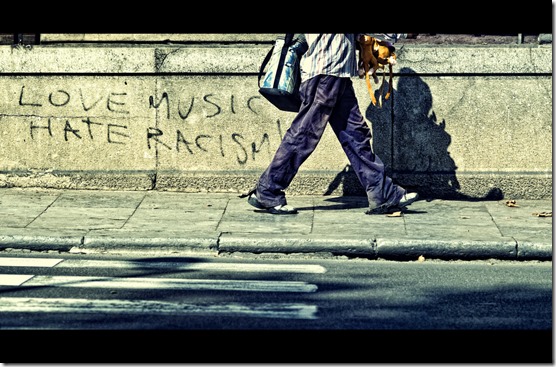
Ending Racism is Central to the Church’s Mission
 Racism was the central problem in the New Testament, and the church was supposed to be the solution being lived out in the world.
Racism was the central problem in the New Testament, and the church was supposed to be the solution being lived out in the world.
The hostility between many Jews and their attitudes toward Gentiles that we see in the gospels was racial hostility. It was deep, and it was dark. These Jews had categories of things that were clean and unclean. For instance, it was unclean to wear cloth of mixed fabric—flax and wool, for instance. It’s all flax or all wool, but nothing mixed. Why?
It had nothing to do uneven shrinking in the wash cycle. It had everything to do with mixing things that are different. The Gentiles mix things, but Jews keep things separate—fabric, eating utensils, and, most importantly, bloodlines.
Things that are Jewish must remain pure, untouched by things that are impure and unclean.
Again, these are not religious categories, they are racial categories.
After Jesus’ first sermon the people tried to kill him because he asserted that God worked through Gentiles also. “Gentile Lives Matter” could have been the title of his message.
They were incensed when he said of a Roman centurion, “He’s got more faith than anyone in Israel!”
Not all Jews believed in the purity of the Jewish race and the impurity of Gentiles. There were some, whose views are reflected in the literature of the book of Jonah and the prophet Isaiah, who said that God loves and cares for all people, not just People Like Us. Jesus was part of this group.
Thus the movement Jesus birthed reflected this. They had the difficult job of living it out. It’s not like their old hostilities just fell away. They had been ingrained in since birth.
In all of his letters Paul confronts racial bigotry, and he had to challenge Peter’s prejudice to his face. In 1 Corinthians 11 Paul recounts the institution of the Lord’s Supper, but he prefaces it by saying, “I hear rumors that you are still recognizing the divisions between Jew and Gentile, slave and free, male and female, even when you eat the Lord’s Supper, and you know what? I believe the rumors.” (My paraphrase.)
He then recounts how Jesus took the Passover meal, which recalled the deliverance from the slavery to Egypt—which was racial slavery, of course; they were made slaves simply because they were Hebrews—and drew a parallel to his own death. “My body is broken and my blood shed to free you from the slavery of racism.”
And Paul ends his account with these words: “For as often as you eat this bread and drink this cup, you proclaim the Lord’s death until he comes again.”
How can eating a meal in a house with the doors closed proclaim anything to anybody? No one can see what they are doing behind those doors.
No, but they could see who went in and who came out those doors—rich and poor, male and female, slave and free, Jews and Gentiles—all the things that are supposed to be kept separate came together and shared a meal and had a life in common.
That wasn’t supposed to happen, but in the church it did. Jesus died to make it happen, and everyone was witness to it. This was the church’s proclamation.
And it still is. Standing up to neo-Nazism and white supremacism isn’t something Christians can decide to maybe do, it is the core of what we’re supposed to do. It’s why Jesus died, and what he died for.
(By the way, we all need to stop using the term Alt-Right. That’s a term that neo-Nazis and white supremacists chose to hide the fact that they are neo-Nazis and white supremacists. We shouldn’t honor their subterfuge. Let’s call them what they are.)
It is our Christian duty to oppose neo-Nazism and white supremacy. It is our duty to make sure we don’t aid and abet and excuse those in our government who aid and abet and excuse them.
It’s gone on too long in our country, and, unfortunately, too long in our churches.
Photo credit: lulazzo [non vede, non sente, non parla] via Visual Hunt / CC BY-NC-ND I am a lifelong student of the Bible, and have been a pastor for over twenty-five years. My desire through this blog is to help people see things in the intersection of Scripture and real life that they might have missed. The careless handling of the Bible is causing a lot of problems in our churches and our culture--and is literally turning people away from the church, and, sometimes, God. I hope to treat Scripture with the respect it deserves, and, even if you don't agree with what I say, give you some insight.
Feel free to leave a comment. I promise to respond to you. All I ask is that you be respectful in your comments.
I am a lifelong student of the Bible, and have been a pastor for over twenty-five years. My desire through this blog is to help people see things in the intersection of Scripture and real life that they might have missed. The careless handling of the Bible is causing a lot of problems in our churches and our culture--and is literally turning people away from the church, and, sometimes, God. I hope to treat Scripture with the respect it deserves, and, even if you don't agree with what I say, give you some insight.
Feel free to leave a comment. I promise to respond to you. All I ask is that you be respectful in your comments. 
Connect with Me